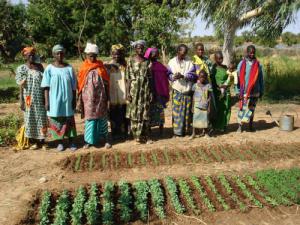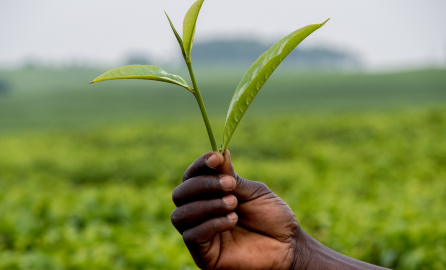Agriculture accounts for two-thirds of Africa’s labour force yet less than 20 percent of its gross domestic product. In the developing world, agricultural and rural nonfarm activities are usually simple and labour-intensive, with little capital and few purchased ‘inputs’, such as fertiliser. As a result, a 2012 study for the International Fund for Agricultural Development (IFAD) found productivity, income and returns for families remain low.
In East Africa, for example, maize production averages two tonnes per hectare, compared to a global average of five tonnes.
How to create more ‘inclusive models in agri-food chains’ was the theme of one of the roundtables at the 5th EU-Africa Business Forum, which hosted about 500 participants in Brussels at the end of March.
A ‘value chain’ describes all activities and services required to bring a product or service from conception to sale. Making these processes more ‘inclusive’ means ensuring that smallholder farmers are included as main actors along the value chain. This can be done through facilitating mutually-beneficial linkages with other stakeholders, training leaders, and the installation of good governance models.
Between 2014 and 2020 more than € 28 billion in aid will be provided by the EU to Africa, in addition to bilateral cooperation from EU Member States. However, participants at the roundtable underlined the importance of being treated as business partners, not aid recipients.
Investment in agriculture is two to four times more effective than other sectors in raising incomes among the very poor, according to the World Bank. At the same time there are huge opportunities for local employment creation and wealth creation through local value addition. While high-income countries add over US$200 of value by processing one tonne of agricultural products, developing countries add less than US$50. Furthermore, while 98 per cent of agricultural production in high-income countries undergoes industrial processing, in developing countries, barely 30 per cent is processed. Yet, agro-processing industries in developing countries generate 40 to 60 per cent of the gross domestic product generated by the manufacturing sector as a whole (Manufacturing Value Added) and agro-industrial products account for as much as half of their total exports, according to UNIDO.
Dr. Martin Märkl from the German Food Partnership – a public-private organisation of 35 companies that aims to improve food security by working with local farmers – said the model of three-year aid projects for example, often did not match the longer time-scales of business projects.
“We saw a need to align donor projects with private sector investment,” he said of GFP initiatives, which may last eight to ten years.
Nigerian agriculture minister Akinwumi Adesina outlined a number of priorities, including the need to:
- Invest in research & development
- Lift grazing standards and food safety
- Improve famers’ access to finance
- Attract more investment from the EU, and
- Ensure farmers have funds to mitigate the effects of climate change
Mr Adesina cited the electronic wallet system being implemented in Nigeria as an easy way to allow farmers to receive subsidies, for example for fertiliser, on a large scale.
This works using near-field communication technology, which enables secure interactions between electronic devices simply by touch.
Mr Adesina explained: “All farmers in the country will get smart cards and all they have to do is take their smart cards, go to the input retailer and tap it on the android phone that every input retailer will have around the country. And they can redeem their input without any problem.”
This process removes government from the procurement and distribution of fertilisers and seeds. Sean de Cleene, senior vice president for global initiatives, strategy and business at the fertiliser company Yara International, said electronic wallets in Nigeria had helped bring about a “massive reduction” in corruption.
It is hoped this will also help facilitate micro-loans, micro-insurance, loan aggregation and crop-insurance for previously marginalised farmers.

Catherine Flouvat, corporate social responsibility manager at Orange telecommunications, gave the example of her company’s Labaroun Kassoua service, launched with the government of Niger in 2011. This allows farmers to access up-to-date price information in more than 70 markets on their mobile phones. The aim is for users to shop for the best price, reducing costly and time-consuming travel to different markets.
Participants spoke of the need to improve infrastructure, but Mr Adesina said this required new ways of targeting investment.
“We can’t just sprinkle infrastructure everywhere, that’s why I think that staple crop processing zones or the growth corridors [...] that have consolidated infrastructure for economies of scale are very important.”
Stability was another watchword. A representative from the Kenya-based fruit and vegetable exporter Interveg said the company signed yearly contracts with its farmers.
“With that they are able to go to the bank, because we help them also to open bank accounts [...] and access credit from the banks, and with this credit they are able to expand.”
Mr Adesina said Nigeria was pushing for an affirmative action policy whereby a certain percentage of bank lending would go to women, who make up 70 percent of farmers.
The reason? “They don’t default; it’s the men that default.”
Mr Adesina also suggested creating an EU-Africa fund to support young entrepreneurs, an idea supported by Tidiane Boye from the United Nations Industrial Development Organisation (UNIDO).
“The success of a fund also depends on the non-financial assistance that we put in place to support the recipients of this money,” Mr Boye said. “This minimises the risk for these financial instruments, supporting them, and also allows recipients to better engage with an entrepreneurial dynamic” in line with the The African (Accelerated) Agribusiness and Agro-industries Development Initiative (3ADI). Moreover, as backed by real time data in the Africa’s Investor’s Report (AIS) and Investment Monitoring Platform (IMP) it is crucial to attract domestic and foreign investment for an agricultural transformation.
A word of caution came from Francesca Romano from the UN’s Food and Agriculture Organisation in Rome, who said international and local investment was not intrinsically good, and that it was important to ensure farmers’ land rights were respected.
“We are operating in an environment where governance is very weak. And where the tenure rights of people and small-holder farmers in particular are very often fragile, not protected, not recognised.”
Jethro Greene from the Caribbean Farmers Network said “small farmers need to own more of the value chain so that their children will inherit a profitable business”. This was essential, he said, to creating long-lasting improvement.
This collaborative piece was drafted with input from Raymond Lataste (EuropeAid) and Florian Iwinjak (UNIDO), with support from the capacity4dev.eu Coordination Team.






Log in with your EU Login account to post or comment on the platform.